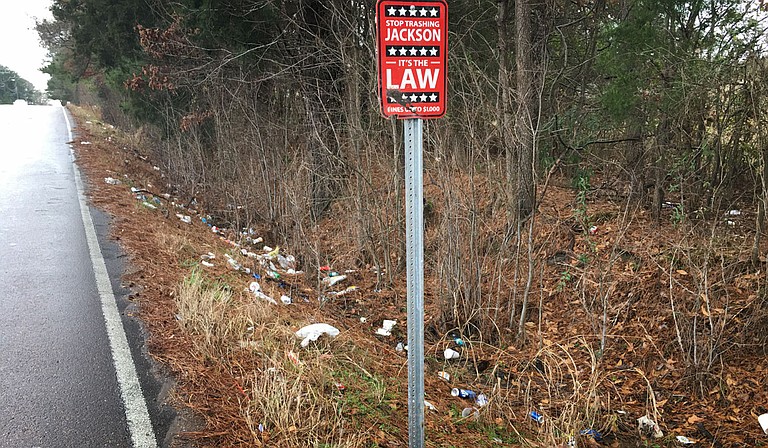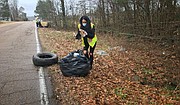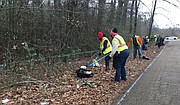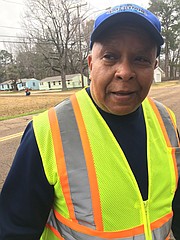The City of Jackson put a sign on West Highland Drive saying those who throw trash beside the street will a $1,000 fine. But it seems not to be working. Photo by Kayode Crown
Wednesday, March 3, 2021
Jackson's DJ Finesse took to Facebook on Feb. 8 to complain about the illegal dumping behind his office on West Capitol Street. The popular 99 Jams DJ—his birth name is Chris Carr—did not hold back his language in rebuking the perpetrators in the post that got more than 100 reactions. The items he complained about included pieces of furniture, clothes and cardboard.
"To you sorry MF who too lazy and cheap to go spend $40 at the city dump and decides to dump on Capitol Street, I hope your transmission goes out," he wrote in apparent anger. "Now we have to clean up behind you...Just know to smile next time because I gotcha on all 16 cameras. SMH...Tag # and all...."
This reporter paid visits to the office and personally saw and took photographs of the trash dumped behind his office. Carr was not in the office during those visits and did not return calls or texts the Jackson Free Press sent for further comments.
Angelique Lee is only a few weeks into her time as Ward 2 Jackson City Councilwoman, and she and other volunteers have already embarked on four waste-disposal exercises, she told the Jackson Free Press. However, days before the most recent cleanup event in her ward on Feb. 6, she was already worried that it would be in vain.
Lee asked Public Works Director Charles Williams at the council meeting on Feb. 2 to provide fencing around a portion of the place where the cleanup was set to happen. "We're worried that after we clean up, they'll still continue to come in and dump," she said. "Is there any way that we can try to partition that area off?" She referred to the "100 Black Men area where a bridge is closed off, and people started using it as a dumping ground."
The councilwoman is not the only one worried if her efforts will go to waste with the continued practice of illegal dumping..
More Trucks or More Information?
Council President and Ward 6 Councilman Aaron Banks shares the same view.
"(Illegal dumping) poses a big problem in the city of Jackson," Councilman Banks acknowledged at the Feb. 2 council meeting. "As soon as we organize cleanups to pick it up, it's back out there (in) three or four days."
Solid Waste Division Manager Lakesha Weathers told the city council that apart from battling with incessant dumping, only one city trash truck is operational, with only one driver. (Contractor Waste Management has its own trucks for home waste pickup.) She disclosed this after Ward 5 Councilman Charles Tillman, council vice president, wondered aloud why he never sees City of Jackson trash trucks in his area to deal with dumping though "we purchased, at one time, three trash trucks."
"We have one operational; we have one operator, that's all we have currently," Weathers said. "We did at one time have four; we're down to two." She said one of the two went to the repair shop on Feb. 1 and that increasing the number of available trucks from two to three will cost thousands of dollars based on quotes she received to repair the third truck.
Tillman said the mayoral administration needs to purchase or lease more trucks to pick up the items illegally dumped. "It is debris everywhere, (and) we got to pick it up. Nobody's going to pick it up," he said. "That's one of the major issues—all this trash and dumping."
"My trucks run all day, every day, so we are picking it up. We're picking it up (on) request, as we see it, as our inspectors see it, we collect it, but unfortunately the residents or outside residents, by our assumption, are coming back and dumping again," Weathers said after she agreed with Tillman's assessment that the problem is significantly affecting the city.
Weathers suggested the need for an informational drive to change peoples' behavior because, she said, "It's not the problem with picking it up, it's keeping it off the ground."
Some people do not know the options available for debris disposal in the city, Weathers said, adding that she is working on an information campaign. She did not indicate when this will happen but believes that it will serve better than increasing the available trucks.
"I have been in talks with some council members about how we can develop a campaign moving forward to educate the public on how not to litter their city," Weathers said.
Banks, however, said that it is not enough to educate, because some people who know what to do, don't. "Education is one thing, but I think we have a problem with contractors that are doing work, residential work, mechanics that are doing work, getting tires, getting roof shingles, getting all that stuff and going on some lonely road, like Lakeshore, Forest Hill roads, in the middle of the night and dumping it instead of being responsible," he alleged.
Cameras and Crimes
Councilman Tillman suggested to Weathers that police could use cameras around the city to ascertain who is doing the dumping. She responded that she does not believe law enforcement is checking the cameras for offenders who are trashing the city.
"I think that (the Jackson Police Department is) more focused on the crime and not the illegal dumping," she responded. "Now, illegal dumping is a crime, but I think that they're more focused on the violent crimes outside of people disposing of things illegally."
Banks said, and Tillman agreed, that there is a need to set a standard of toughness on the crime of illegal dumping. Ward 4 Councilman and Mississippi District 66 Rep. De'Keither Stamps asked how many have been cited for illegal dumping in the city. "We see all these illegal dumping, we don't see a lot of the tickets being issued," he said.
"I don't want to go into too much detail, but it has been requested (from Jackson Police Department), and (they) simply stated that they cannot write tickets. What do you want us to do? How do you want us to address this?'" Weathers reported. "As far as I know, there are no tickets being written for littering or illegal dumping. I have no documents or any records showing where tickets or arrests have been made."
Weathers told the Jackson Free Press that she has hard evidence that those contracted for trash disposal come from outside Jackson to dump trash in the city. "Most of the time, it's contractors, people that have been hired to clean up properties, or maybe people that are in the remodeling business, and they load their trucks up, and they drive here, and they dump," she said. She did not provide that evidence to date.
Politics and Corruption of Dumping
A 2019 NBC report about illegal dumping described the criminal activity of those who collect money to dispose of rubbish and look for where to dump them, causing environmental degradation.
"Legitimate waste carriers charge their customers a fee of several hundred (dollars) for the removal of each ton of waste. Almost half of that fee is paid to a licensed transfer station that then sorts and disposes of the waste. But criminals are offering to take waste at lower prices and then dump it at farms, industrial sites or on estates," the report said. "They pocket the entire fee and leave landowners with hefty bills to remove the junk."
Research by David Naguib Pellow at the University of California, Santa Barbara, "The Politics of Illegal Dumping: An Environmental Justice Framework," found that illegal dumps disproportionately burdened communities of color and low-income neighborhoods.
He reported the political corruption of illegal dumping where one Christopher Joseph bribed some aldermen in Chicago to look the other way, paying $5,000 per month to one of them.
"Since the late 1980s, he was in the business of 'recycling' construction and demolition (C&D) waste and finding places to dump it at the lowest possible cost," Pellow wrote. "The vast majority of the waste Christopher was dumping originated from highway construction projects and remodeling firms across the mostly white North Side of the city and suburbs."
"John Christopher (dumped) his waste in working-class and low-income African American and Latino communities on Chicago's West Side, particularly Lawndale and Austin."
Weathers is convinced that a preponderance of illegal dumping is not by Jackson residents, telling this reporter that she informed the Jackson Police Department that her department's officials caught culprits from outside the country illegally dumping. She doesn't know what they did with the information.
The Jackson Free Press made repeated calls, left voice messages and sent emails to Jackson Police Department's Information Officer Sam Brown beginning Feb. 5, asking for information about enforcement against illegal dumping in the city. He had not responded nearly a month later at press time.
Weathers told the council that the City cannot provide dumpsters designed to hold waste for transfer to garbage trucks for people who want to clean up their neighborhoods and require that service.
"We have dumpsters that we can bring out, but unfortunately we don't have the operators right now to bring those dumpsters out," she said. "We're doing the best we can, (in) what we have, we are extremely limited." The manager later told the Jackson Free Press that the only dumpster truck operator the city had retired in January.
Rolling Up the Sleeves
More than 10 people gathered with Ward 2 Councilwoman Lee on Feb. 6 at Presto Lane in Jackson to pick up trash along the road. They received an unwelcome guest at 12:35 p.m. as it started raining, but no one tried to seek shelter. Fortunately, it only lasted a few minutes before the sky cleared on that 42-degree day.
Volunteers started meeting at the rendezvous spot at Callaway High School on Beasley Road by 11:30 a.m. that day, and Lee welcomed participants and handed each a yellow vest and trash picker if they did not bring them.
The clean-up effort has been a recurring part of her agenda, which has covered various parts of Ward 2 since her election to the city council in December, Lee told the Jackson Free Press.
Merrimack chemical vendor Roland Powell came from south Jackson to join in the effort on Feb. 6. "Jackson is too beautiful of a place and too nice of a city to keep the streets looking like this," he said. "I know the city doesn't have the resources right now to really keep up with the trash clean-up, so we do this (about once a quarter) in south Jackson."
Green Elementary School Principal Terrance Hill sees his involvement in the cleanup as a statement of his commitment to the Ward where his school is located. "When (Lee) posted (on social media) that she will be kind of spearheading this clean up, I just said I'll be here," he said. "I'll do anything I can to kind of help and support this community."
Some City of Jackson workers were there to assist with the clean-up. "Everybody knows that the city of Jackson has an illegal dumping problem," City solid waste inspector Ellis Knight told the Jackson Free Press. "What we need to do is start getting (the) police to start enforcing more rules on illegal dumping, and I think that our city will be back to where it was."
"We know that we have a shortage of police, so we really cannot just blame police officers," he later added. "But if we are members of the community, start working together and stop your friends from illegal dumping, going down the street, dropping stuff out the window, I think (with) that we'll see a change."
The Cost of Waste Disposal
The City of Jackson pays Waste Management $9.27 per residential unit per month to pick up trash from people's houses all over the city, based on the terms of the contract the Jackson Free Press obtained. The same company has a waste-disposal contract at $25 per ton.
Waste Management promised to provide 30-cubic yard "roll-off" containers for each ward for free on one day per month, but the City has to station its staff there to monitor people bringing trash. Weathers told the Jackson Free Press that her office could not station staff there because they are short. So that full exercise stopped happening. Instead of seven locations per month, the City operates roll-off dumpster days at one location in the city per month.
Knight explained that the people and contractors have another option as well. "I think they should go to the city of Jackson landfill in Byram," he said. "I don't know if people know it; it's on (6810 Interstate-55 South) Frontage Road in Byram. You can (dispose) everything that you need to (dispose) there." Weathers told the Jackson Free Press that single-axle-trailer-load costs $25 for disposal, with additional rates available through her office.
The inspector said that the solid waste division of the city does curbside pickups. "If you've got bulky items or tires, you call 601-960-1193, the solid waste division, and they'll put it on the list board to be picked up." This service charges a fee based on the size of the trash.
The city offers curbside pickup of tires for free on Wednesdays, Knight added. "You've got a call 601-960-1193 and get put on the list and then we will come pick them up for free, up to five tires."
Illegal Dumping is Problematic
The Mississippi Department of Environmental Quality described illegal dumping as a problematic issue that local and state governments must address continually.
"Most commonly, people choose to illegally dump because they do not want to pay for disposal or because local disposal options do not appear to be available or convenient," it said on its website. "Often illegal dumping occurs on unsecured vacant lots, lots with abandoned buildings, remote spaces, dead-end roads, tree plantation lands, and forested areas, alleys and remote roads, outskirts of cities, poorly lit areas, open sand and gravel mines, down ravines and gulleys, and in other similar un-secure areas."
MDEQ advocates early reporting and resolution for illegal dumping so that the problem does not continue to escalate.
Illegal dumping comes with economic and environmental costs, the head of MDEQ told the Jackson Free Press." Hazardous and non-hazardous waste, we manage and regulate very carefully because when those things are disposed of in ways that don't comply with the regulations, it poses an environmental risk," Executive Director Chris Wells said in an interview.
"So if you have an illegal dump (into) a ravine or onto property somewhere when that is exposed to the elements, not contained in any way when rain falls on it, it picks up contaminants, and when that stormwater runs off, it carries those pollutants, those contaminants with it."
Wells said proper disposal of solid waste in designated landfills with adequate containment is essential. Also, illegal dumping constitutes an eyesore and attracts an additional cleaning cost, deterring property investment.
"Any kind of economic development can be deterred or stymied when there's illegal dumping because anybody that buys that property becomes liable for cleaning that up," Wells said.
Dumping, Crime and Development
Amory Anne Brandt's master's thesis at San Jose State University, "Illegal Dumping as an Indicator for Community Social Disorganization and Crime," drew a link between illegal dumping and crime.
"Not only does illegal dumping contribute to physical disorganization, but it is associated with higher crime rates," she wrote. "The positive relationship between dumping and crime suggests that communities with more illegal dumping also experience higher rates of crime."
"This finding suggests that illegal dumping could not only serve as a predictor for social disorganization, but also for crime," she added. "Cleaning up illegal dumping itself may not directly influence crime or social disorganization, but monitoring it could serve as an important predictor for community health."
The worse a neighborhood looks, the more crime it tends to suffer, the Heritage Foundation argues. "When residents take the simple step of cleaning their neighborhood, it tells criminals that the residents care about their community and thus are more likely to report criminal behavior. Where conscientiously applied, a clean-up strategy cuts crime," the foundation said in a report titled, "An Empowerment Strategy For Eliminating Neighborhood Crime."
Researchers John E. Eck and William Spelman found that Briarfield Apartments in Newport News, Va., suffered a high crime rate before city agencies carted trash away, removed abandoned cars, filled potholes and swept the streets. The result was a 35% decrease in the burglary rate.
In the Amani neighborhood in Milwaukee, Wis., residents complained of the trash-can treatment they say they are experiencing because of incessant illegal dumping. "(The city) might come and get it today, but somebody else is going to come and dump in three days, so it doesn't seem like the problem ever really goes away," Amani United neighborhood group president Jeramie Rice Bey told Milwaukee Journal Sentinel last year.
Amani is a struggling neighborhood with various problems, ranging from food deserts to foreclosed homes to entrenched poverty, and illegal dumping makes things worse, the newspaper reported. It also mentioned how other cities are dealing with illegal dumping, including increasing fine for repeated offenders, putting up cameras, hiring full-time officers to enforce illegal dumping laws.
Solutions Across America
The Milwaukee Department of Neighborhood Services set up an online form and phone app for reporting illegal dumping. Still, community leader Denisha Tate-McAlister objected to that initiative, saying that the people should not have to be responsible for catching perpetrators, and authorities can say that they are the culprits if they cannot prove otherwise.
California's Almeda County developed a multifaceted plan in 2019 to tackle illegal dumping. After one year of implementation of the pilot plan in two illegal dumping hotspots in East Oakland area of the county, "[b]ased on the perceptions of community members, satisfaction with the City and County's efforts to address illegal dumping increased by 11 points," the report said.
The county believes that the success of its three-pronged effort—education, eradication and enforcement—was due to enforcement of existing laws, using camera-based enforcement strategies, reducing barriers to eradication, embracing cross-sector partnerships, and community organizing as key to sustainability and crime prevention through environmental design. The report suggested that streets with little foot traffic and poor lighting at night encourage illegal dumping activity.
"Past efforts to curb illegal dumping include planting trees, placing concrete barriers and planter boxes to block illegal dumping spots, but without a consistent enforcement effort by the City, these efforts have had a minimal impact on the overall quality of the street and the surrounding neighborhood," it explained.
"Partnership with law enforcement was effective (in) reducing dumping and blight. Without law enforcement participation, our efforts amounted to a free garbage service to illegal dumpers."
The report indicated that having bushes cleared and planting trees will discourage littering, "prevent future dumping and provide a healthier environment that discourage(s) dumping" because "visual cues of deterioration attract other crimes."
"Removing the weeds will help with the visual cues creating a clear and open space that will make illegal dumpers hesitate to dump," it said. "(A) side of the street, lacking any private property owners to care for it for nearly a mile, sat neglected—attracting a constant flow of illegal dumping."
It said that depending on citizens reporting to curb illegal dumping will lead to the neglect of areas not frequently visited.
'It Was a Hot Mess'
Comments on the post by DJ Finesse included people expressing how incredible they found the problem. Shady Oaks Homeowners and Community Neighborhood Association President Sirena Wilson shared a picture of illegal dumping similar to what DJ Finesse experienced as a comment on his post.
Wilson sent the Jackson Free Press other pictures of illegally dumped trash and furniture that she has to deal with as a neighborhood leader.
"It was cleaned up (at neighborhood cleanup exercises). We called the city to come out and pick it up; two weeks later, someone dumped it there again. It was a hot mess," she said about the picture she posted on Facebook.
She said catching the people involved in illegal dumping is a way to address the problem. "Right now, we're trying to identify those people that are illegally dumping, and we're trying to get with the community to see if they can watch out, to see if they're able to see (them)," she said.
"So we're trying to make sure that if we can get the citizens to look out for these cars (or) trucks, especially late at night," Wilson added. "If they see something, to say something."
Email story tips to city/county reporter Kayode Crown at [email protected].





Comments
Use the comment form below to begin a discussion about this content.
Sign in to comment
Or login with:
OpenID